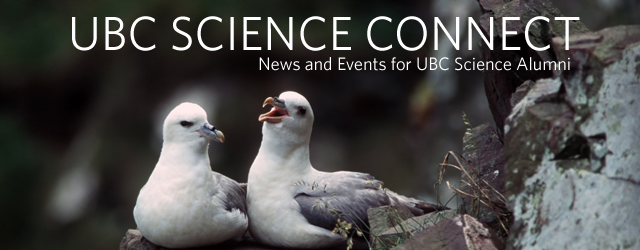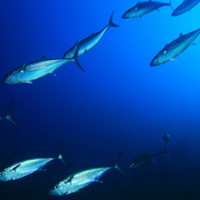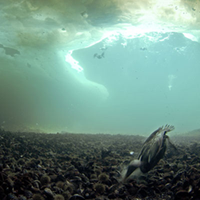|
|
|
Seabirds in Pacific Northwest getting a belly full of plastic
Plastic pollution off the northwest coast of North America is reaching
alarming levels – leaving seabirds with bellies full of plastic.
A study led by UBC zoologist Stephanie Avery-Gomm looked at the amount
of plastic ingested by northern fulmars, which feed exclusively at sea.
Necropsies performed on 67 beached fulmars found in BC, Washington and
Oregon indicated 92.5 per cent of the birds had plastics – twine,
Styrofoam, candy wrappers – in their stomach. One bird was found with
454 pieces of plastic in its stomach.
The study substantiates the use of northern fulmar as biomonitors of
plastic pollution in the North Pacific. “Like the canary in the coal
mine, northern fulmars are sentinels of plastic pollution in our
oceans,” says Avery-Gomm.
Read More »
|
| |
Events
 |
|
Apple festival
A family event for all ages, the UBC Apple Festival celebrates one of
BC's favourite fruits. Join us at the UBC Botanical Gardens.
» October 13-14, 2012
|
|
|
|
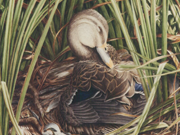 |
|
Watercolour birds
Watercolours by Lex Alfred Hedley, an artist with an interest in North
American birds, are on exhibit at the Beaty Biodiversity Museum.
» To November 12, 2012
|
|
|
|
 |
|
Gairdner symposium
Two prominent scientists, William Kaelin and Jeffrey Ravetch, give free lectures as part of the 2012 Gairdner Symposium.
» October 22, 2012
|
|
|
|
|
Sneaky parasites steal genes from host
Two species of single-cell parasites co-opt ‘ready-made’ genes from
their hosts and use the genes to further exploit their hosts. This
process aids the parasites’ rapid evolution.
The study by UBC and University of Ottawa researchers shows that the parasitic microbes Encephalitozoon hellem and Encephalitozoon romaleae, commonly found in the intestines of vertebrates, can acquire genes that assist them in the production of folate.
“Two species have actually acquired new genes that work together to
make an essential nutrient that the parasites would otherwise have to
steal from their host – opening up new tissues or even new hosts as
targets for infection,” says UBC biologist Patrick Keeling, director of
the Centre for Microbial Diversity and Evolution.
Read More »
|
| |
|
|
Rebuilding global fisheries would make them more valuable
Rebuilding global fisheries would make them five times more valuable
while improving ecology. A UBC study, published in the online journal PLoS ONE, outlines ways global fisheries could go from losing US$13 billion per year to making $54 billion.
Reducing the size of the global fishing fleet, eliminating harmful
government subsidies, and putting in place effective management systems,
are some of the ways fisheries could become more effective and
eco-friendly.
“If the environmental and sustainability reasons alone can’t convince
global governments to take action, the financial incentives should,”
says Rashid Sumaila, a fisheries economist and director of the UBC
Fisheries Centre.
Read More »
|
| |
|
|
Class Connections: Memory Elvin-Lewis
|
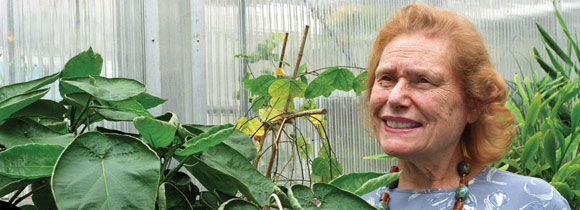 |
|
Memory Elvin-Lewis, renowned ethnobotanist and infectious disease
microbiologist, will be recognized with an Alumni Award of Distinction
on November 14. This spring, UBC awarded Memory and Walter Elvin-Lewis
honourary degrees.
Elvin-Lewis graduated from UBC in 1952 and went on to obtain a PhD at
the University of Leeds. Together with her husband she catalogued
hundreds of traditional herbal remedies used in the tropics, preserving
the knowledge of indigenous peoples so that ancient healing methods can
be analyzed and applied to modern medicine.
Memory and Walter’s interest in herbal medicine led to the release of
Medical Botany: Plants Affecting Man’s Health in 1997 – recognized as a
standard work in the field. Memory was also involved with the treatment
of the patient who suffered from the first recorded case of AIDS in the
United States. She is a professor of biomedicine at Washington
University in St Louis.
Read more Class Connections»
Send us an update»
|
| |
UBC's New Earth Sciences Building
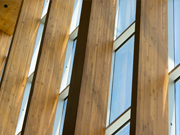 |
|
Get a sneak peek at UBC’s new Earth Sciences Building on Flickr, or read more.
|
|
|
|
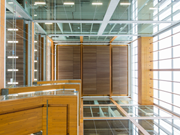 |
|
ESB is the largest panelized wood building in North America.
|
|
|
|
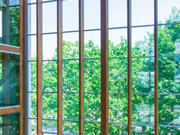 |
|
The wood materials in the ESB will sequester about 2,600 tons of CO2.
|
|
|
|
|
Kudos
|
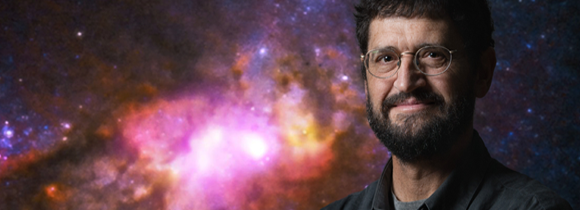 |
|
UBC researchers win top cosmology prize
UBC cosmologists Mark Halpern and Gary Hinshaw (pictured) have been awarded
the 2012 Gruber Cosmology Prize for their work as part of a 2003 NASA
mission that pinpointed the age of the Universe at 13.75 billion years.
Math outreach recognized with Adrien Pouliot Award
Melania Alvarez, outreach coordinator for Mathematics, has received the
2012 Adrien Pouliot Award. The award, sponsored by the Canadian
Mathematical Society, recognizes contributions to mathematics education
in Canada. Alvarez was singled out for her work with Aboriginal students
and her role in promoting math to the general public.
Simon Peacock re-appointed dean
Simon Peacock has been appointed
to a second six-year term as Dean of Science. His second term will run
July 1, 2012 through June 30, 2018. Prior to joining UBC, Peacock was
Divisional Dean of Natural Sciences and Mathematics at Arizona State
University.
Two new graduate training programs arrive at UBC Science
UBC Science has received CREATE grants
totaling $3.3 million from the Natural Sciences and Engineering
Research Council. The two newly funded programs – QuEST: Quantum
Electronic Science and Technology and MAGNET: Multidisciplinary Applied
Geochemistry Network – join four other CREATE graduate training programs
housed at UBC Science.
Statistics student receives Centers for Disease Control and Prevention award
UBC statistician Liangliang Wang has won a Charles C Shepard Science
Award for her co-authorship of a paper that calls into question results
derived from a common algorithm used in Chlamydia trachomatis screenings. The Centers for Disease Control and Prevention considered 69 papers for the honour.
|
| |
|
|
Stay in touch! Update your information
How do I update my address, email and/or contact information with UBC Science?
There are several easy ways to update your contact information – through our online form;
via e-mail alumni@science.ubc.ca, or by phone 604-822-1864. We use
a central alumni database, so if you have changed your contact
information through the web link above, we will automatically receive
your update from Alumni Affairs. Likewise, if you change your contact
information through us, those changes will be made in the alumni
database.
|
| |
|
|
Arctic ducks inspire mathematical modelling
UBC mathematicians, initially inspired by the behaviour of ducks diving
for sea urchins, have employed computer simulations to show that
searching-exploiting resource systems exhibit spatial patterns
resembling 'waves of pursuit' as individuals rush between resource
sites. The researchers also discovered that overall strategies may
fluctuate over time if individuals switch behaviours either by learning
or by reproductive fitness.
"Lots of people have studied so called producer-scrounger strategies,
but never in this particular way," says UBC mathematician Leah
Edelstein-Keshet. "We're showing that these strategies affect – and are
affected by – the way food is distributed in space."
Read More »
|
| |
|
|
Chemistry, Biology Added to Mentor-for-a-Day Menu
We’ve added new Career Nights in chemistry and biology to our 2013
mentorship roster. A short-term investment of your time can be a huge
source of inspiration and guidance for students. And the earlier we hear
from you, the more time we have to find the right option for you -
opportunities that focus on women in science, discipline-specific
events, or sessions that look at a broad array of careers in science.
Visit science.ubc.ca/support/alumni/getinvolved or contact alumni@science.ubc.ca.
|
| |
UBC Science swag
 |
|
UBC Science t-shirt: tree
|
|
|
|
|
|
 |
|
UBC Science t-shirt: feather
|
|
|
|
|
|
